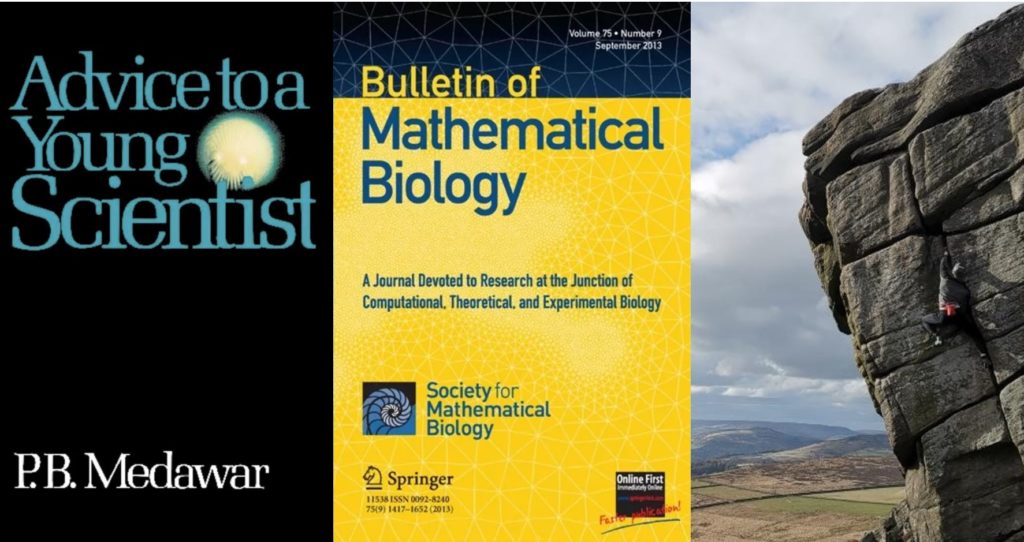Written by Drs Paul Roberts and Jon Mueller
In April 2024, Paul Roberts published a paper “Advice to a Young Mathematical Biologist” in the Bulletin of Mathematical Biology. The title of his paper is a homage to “Advice to a Young Scientist” – a classic book in the scientific advice literature. It was written by Nobel prize laureate Peter Medawar, who was Mason Professor of Zoology at our university from 1947-1951. Occasion enough for Paul and Jon to team up and to present advice about a balanced academic life to junior and senior IMSR researchers.

In the first half, Paul explained the background and motivation for his paper, which offers advice to early-mid career researchers across the mathematical, physical and life sciences. Inspired by a past Presidents’ panel discussion at the 2023 Society for Mathematical Biology conference, Paul compiled advice from ten past and current Presidents of the Society for Mathematical Biology across ten specific topics, together with two, more general discussions. In the seminar, Paul gave participants the opportunity to choose which of the topics covered in his article they would like to discuss. The topics selected covered deciding if a career in academia is right for you; formulating a research question; networking; and what do you wish you had known when you were an early-mid career researcher? A number of themes were covered within these topics such as dealing with failure and rejections, career planning and what it looks like to develop independence as a researcher. This quickly developed into a highly interactive chat with the audience about their own experiences, challenges and lessons, and how these vary across disciplinary, national and personal contexts.
In the second half, Jon presented thoughts on balancing a career as an endocrine bio-scientist with other needs of a “normal” life. Jon mainly used memes and tweets he had gathered and curated on the topic for a couple of years. Consciously, his “anti-motivational” presentation aimed at raising awareness of the individual to pause, to rest, to relax, at times, before bigger issues might develop. Jon addressed several re-occurring assumptions in junior academics — such as the belief that one would be absolutely unique – and alone – with certain problems, that actually occur again and again in academia. A good mentor, in Jon’s words, might be someone – not at all perfect – but willing to listen and learn; humility certainly would make one a better mentor. Jon surprised with the idea that graduate students also have a certain responsibility towards their mentors; after all, mentors are also about to change!
Jon highlighted the non-linearity of scientific research, using the analogy of boiling down fresh spinach – doubling your effort does not necessarily double the quality of the result. He mentioned academic guilt as a major, non-healthy, driver of action in academia. Jon ended by offering anyone an opportunity to chat, should they feel the need for it; and for those who felt too busy to chat, he provided this Old Zen saying:
“You should sit in meditation for 20 minutes a day, unless you’re too busy; then you should sit for an hour.”
Following the presentations, we had a good and open discussion on various needs of junior and senior academics. As a little study prize we gave out a copy of Medawar’s book – congrats to Aqfan Jamaluddin for your new reading material. We received positive feedback for the whole event from the audience. Very good incentives to continue offering EDI seminars in the future.
More stuff to read:
Here is Paul’s recent paper Roberts PA. 2024. Advice to a Young Mathematical Biologist. Bulletin of Mathematical Biology 86:52. https://doi.org/10.1007/s11538-024-01269-1.
Here is Jon’s guide for better rebuttals Mueller JW. 2021. How to reply to reviewers’ comments: A guide to better rebuttals. ASBMB Today. https://www.asbmb.org/asbmb-today/careers/102821/how-to-reply-to-reviewers-comments.
Thanks to Tom Lightning for providing an image of himself, hanging around.
